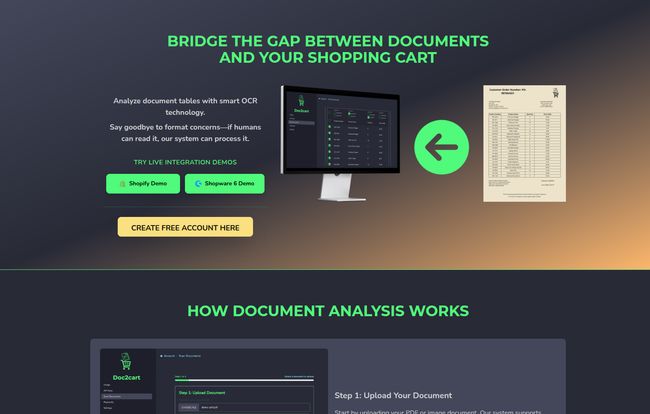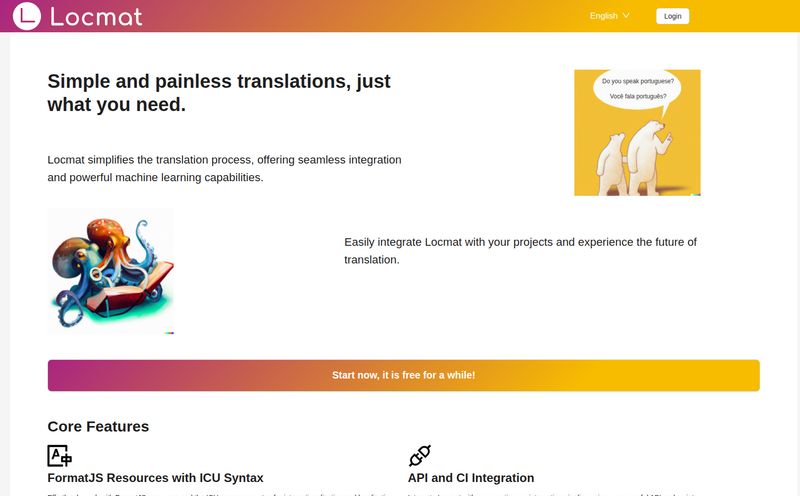If you've ever run an e-commerce store, you know the feeling. A supplier—bless their heart—sends over their “updated” product catalog. It’s a 200-page PDF. Scanned. Slightly askew. Your job? Get all that product information, SKUs, and ahem, creative pricing tiers into your Shopify or Shopware store. The coffee goes on, your soul quietly weeps, and you kiss your weekend goodbye.
I’ve been there. I’ve spent more hours of my life copy-pasting from PDFs than I care to admit. It’s the digital equivalent of digging a ditch with a spoon. So when I stumbled upon a tool that claims to automate this whole mess, my inner, perpetually-caffeinated SEO blogger sat up straight. The tool is called Doc2Cart, and it promises to be the bridge between those nightmare documents and your pristine shopping cart. But does it actually work? Let's find out.
So, What Exactly is Doc2Cart?
Think of Doc2Cart as a translator. It takes gobbledygook—in the form of invoices, price lists, and catalogs in formats like PDF, PNG, or even a classic JPEG—and translates it into a language your e-commerce platform understands: structured, organized data. At its core, it's an API-first platform that uses some pretty smart Optical Character Recognition (OCR) to read documents, pull out the important bits (product names, prices, descriptions), and package them up neatly for you.
It’s not trying to be your all-in-one e-commerce management suite. And frankly, I appreciate that. It does one thing: it liberates data trapped in documents. What you do with that data afterwards is entirely up to you. This focus is its biggest strength.
How the Magic Happens: A Quick Walkthrough
The process laid out on their site seems straightforward, and in my testing, it pretty much holds up. There are no convoluted 10-step processes here. It boils down to four main stages.
Step 1: Feed the Machine Your Documents
You start by uploading your document. The system isn't too picky, accepting PDF, PNG, JPEG, and TIFF files. You just drag and drop your file into their uploader. Simple enough.
Step 2: The Automated Analysis
This is where the OCR magic kicks in. Doc2Cart scans the document and starts extracting data from tables and lists. You see a little progress bar, and for a moment, you feel like you're in a spy movie. It's surprisingly fast, though I'd expect a massive, poorly scanned document to take a bit longer.
Step 3: The All-Important Review and Refine
No AI is perfect, and Doc2Cart knows this. It presents the extracted data in a clean interface and lets you review it. You can correct any misinterpretations, select which columns you actually want, and generally clean things up. This human-in-the-loop step is critical. Never trust a robot completely, right?
Step 4: Export or Integrate
Once you’re happy, you can export your shiny new data as a CSV or XLSX file, ready for a manual import. Or, if you're more technically inclined, you can use their API to pull the data directly into your own systems for a fully automated workflow.

Visit Doc2cart
Choose Your Adventure: The Wizard vs. The API
This is where I think Doc2Cart really gets its audience. They understand that “e-commerce store owner” is not a monolith. You’ve got different needs, different skills, and different levels of patience for technical jargon. So, they offer two distinct ways to use the platform.
The Document Analysis Wizard for the Hands-On Manager
This is the no-code, user-friendly path. It’s the four-step process I just described, all handled through a clean web interface. If you're a store manager who just wants to process a few supplier catalogs a month without calling a developer, this is for you. It’s designed for efficiency and ease of use.
The Powerful API for the Tech-Savvy Team
For agencies, larger businesses, or anyone with a developer on hand, the API is the main event. It gives you programmatic access to every step of teh process—uploading, checking analysis status, and retrieving data. You can build some seriously powerful custom workflows with this, like an automated system that checks a supplier's FTP server for new price lists, sends them to Doc2Cart, and flags you on Slack when the processed data is ready. It’s all about scalability and integration.
Let's Talk Money: A Look at Doc2Cart's Pricing
Alright, the all-important question: what’s this going to cost? The pricing is tiered based on the number of pages you need to process per month. One of the best things, in my opinion, is that every plan starts with 30 free pages for analysis each month. It's a fantastic way to kick the tires without committing.
Here’s a quick breakdown of their plans:
| Plan | Price (EUR/month) | Pages/Month | Key Features |
|---|---|---|---|
| Starter | 17€ | 200 | Email Support |
| Professional | 125€ | 1,500 | Email Support |
| Business | 315€ | 5,000 | Email Support, Technical Consultations |
| Enterprise | 1,255€ | 20,000 | Email Support, Technical Consultations |
The pricing seems fair for the value it provides, especially when you move into the higher tiers where the cost-per-page drops significantly. The jump from Starter to Professional is quite a leap, though, which might leave some growing businesses in an awkward middle ground.
The Good, The Bad, and The Nitty-Gritty
No tool is perfect. After spending some time with Doc2Cart, here's my honest take on what shines and what could be better.
What I Genuinely Appreciate
The sheer time-saving potential is undeniable. We're talking about taking a task that could consume days of tedious, error-prone work and condensing it into an hour or two. The dual approach of a simple Wizard and a powerful API is just smart design. They also have pre-built extensions for major platforms like Shopify and Shopware, which is a huge plus for those who don’t want to mess with custom API work.
A Few Things to Keep in Mind
There are a couple of caveats. The pricing, while fair, could be a hurdle if you only process a handful of documents irregularly. The Starter plan is great, but if you have one massive 300-page catalog to process one month and then nothing for the next two, the model is less ideal. Also, and this is a big one for planners: unused pages don't roll over. It's a 'use it or lose it' policy, so you need to pick your plan carefully. If you exceed your monthly page limit, you'll get API errors until the next billing cycle, which could cause a workflow stoppage if you're not paying attention.
Frequently Asked Questions about Doc2Cart
- Is there a free trial for Doc2Cart?
- Yes, in a way. You get 30 free pages to analyze every month when you sign up, even on the free account. It's a great way to test the service with your own documents.
- What happens if I go over my monthly page limit?
- The system will stop processing new documents and return an error. You'll either have to wait for your quota to reset at the start of the next billing cycle or upgrade your plan to get more pages immediately.
- Which document formats are supported?
- It supports the most common ones you'll encounter: PDF, PNG, JPEG, and TIFF.
- How long does it take to process a document?
- It depends on the size and quality of the document, but for most standard files, it's usually just a few minutes.
- Can I change or cancel my subscription?
- Yep. You can change your subscription tier or cancel it at any time directly from your account panel.
The Final Verdict: Is Doc2Cart Worth It?
So, is Doc2Cart the magical cure for all your data entry woes? For a lot of people, I honestly think the answer is yes. If you're an e-commerce manager, an agency, or a business that regularly deals with product data locked away in non-editable documents, the ROI is a no-brainer. The time you save will almost certainly outweigh the monthly cost.
It's a specialized tool built to solve a very specific, very annoying problem. It’s not for the casual user who gets one PDF price list a year. But for those of us in the trenches, fighting the good fight against bad data formats, Doc2Cart is a seriously powerful weapon to have in your arsenal. It bridges that frustrating gap between the old way of doing things and the efficient, automated world of modern e-commerce. And it might just give you your weekends back.



